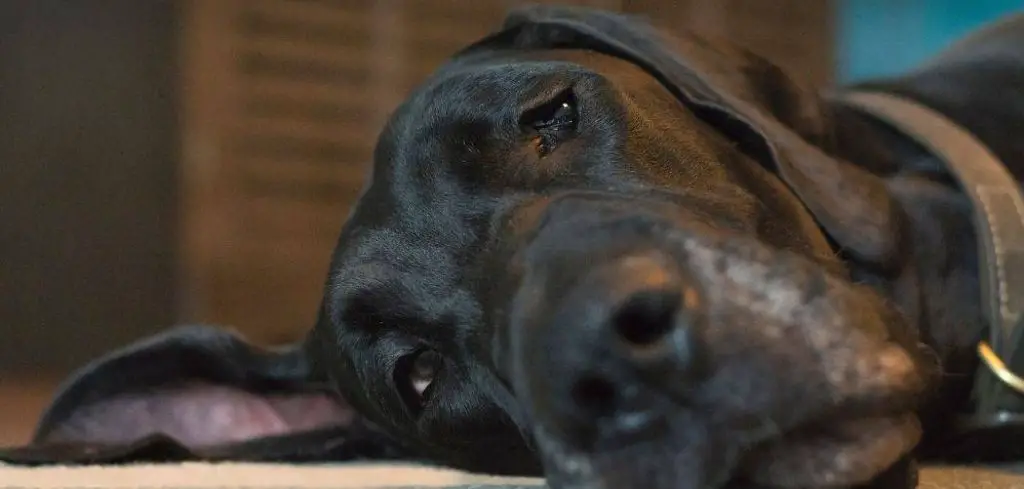When your dog is vomiting, drooling excessively, and acting lethargic, it’s more than just a minor upset stomach — these symptoms can signal a serious health problem that requires prompt attention.
We outline the common causes of vomiting, drooling, and lethargy in dogs, what you can do at home, and when to seek veterinary help.
Dog Vomiting, Drooling, and Lethargic — Why It Happens
Vomiting, drooling, and lethargy in dogs often point to underlying issues that may range from digestive problems and toxin exposure to heatstroke or organ disease. Sometimes the cause is temporary and treatable at home, but in many cases, these symptoms indicate that something more dangerous is happening inside your dog’s body. Quick action can make all the difference in your dog’s recovery.

Common Causes of Vomiting, Drooling, and Lethargy in Dogs
Gastrointestinal Obstruction
A blockage in your dog’s stomach or intestines can quickly cause vomiting, drooling, and extreme fatigue.
This can happen if your dog swallows a toy, bone fragment, or other foreign object.
The blockage prevents food and water from passing normally, leading to nausea, excessive saliva, and dehydration.
In severe cases, it can cut off blood supply to parts of the digestive tract, making it a life-threatening emergency.
Signs may include repeated vomiting, refusal to eat, a painful or bloated belly, and restlessness alternating with extreme lethargy. Immediate veterinary care is essential.
Read more: My dog is drooling and lethargic (Here’s why)
Toxin Ingestion
If your dog has gotten into something toxic — such as chocolate, grapes, household cleaners, or certain plants — vomiting and drooling are often the first symptoms.
Lethargy follows as the body reacts to the poison and organs begin to struggle. Some toxins can damage the liver, kidneys, or nervous system within hours.
You may also see trembling, seizures, or changes in breathing.
Any suspicion of toxin ingestion should be treated as an emergency, as early treatment can significantly improve your dog’s chance of recovery.
Heatstroke
Dogs can overheat quickly in warm weather, especially brachycephalic breeds like Bulldogs and Pugs.
Heatstroke causes drooling due to panting, vomiting from overheating, and lethargy as the body temperature rises to dangerous levels. If left untreated, it can lead to organ failure or death.
Look for rapid breathing, bright red gums, collapse, or disorientation. Heatstroke requires immediate cooling measures and emergency veterinary intervention.
Severe Gastroenteritis
An inflamed stomach and intestines can cause a combination of vomiting, drooling, and fatigue.
This may result from infections, dietary indiscretion (like eating spoiled food), or parasites. Dogs may refuse food, appear weak, and become dehydrated quickly. Severe gastroenteritis can progress fast, especially in puppies and senior dogs.
While mild cases sometimes resolve with home care, severe cases require fluids, medications, and close monitoring by a vet.
Organ Disease
Liver or kidney disease can trigger nausea, drooling, vomiting, and extreme tiredness.
These organs play a vital role in filtering toxins from the body. When they are not functioning properly, waste products build up in the bloodstream, making your dog feel weak and unwell.
Chronic cases may develop slowly, but sudden worsening can occur and requires urgent veterinary evaluation.
Bloat (Gastric Dilatation-Volvulus)
Bloat is a rapidly developing, life-threatening condition where the stomach fills with gas and may twist.
Along with drooling and restlessness, dogs may attempt to vomit without bringing anything up. Lethargy sets in quickly as shock develops.
This condition is most common in large, deep-chested breeds and needs immediate surgical intervention.
What to Do If Your Dog Is Vomiting, Drooling, and Lethargic
If your dog shows all three symptoms, start by removing any potential hazards like toxic foods or small objects. Keep your dog in a cool, quiet area and encourage rest.
Offer small sips of fresh water, but avoid giving food until vomiting has stopped for several hours. Monitor their breathing, gum color, and energy level closely.
Avoid giving human medications, as many are dangerous to dogs. If symptoms are mild and improving, you can watch closely for a few hours — but if they worsen or new symptoms appear, seek veterinary care immediately.
When to Call or Visit Your Vet
You should contact your vet right away if your dog:
Vomits repeatedly or cannot keep water down.
Shows signs of abdominal pain, swelling, or bloating.
Has ingested a known or suspected toxin.
Displays weakness, collapse, or confusion.
Has pale, blue, or bright red gums.
Even if you are unsure, calling your vet for guidance can save precious time in an emergency.
Read more: Dog Drooling, Shaking, and Lethargic (Here’s why)
Key Takeaway
Vomiting, drooling, and lethargy in dogs are symptoms you should never ignore. While some causes are mild, many are dangerous and require urgent treatment.
Act quickly to remove hazards, keep your dog comfortable, and contact your veterinarian if symptoms persist or worsen.
Your attentiveness and swift action can make all the difference in your dog’s health and recovery.
